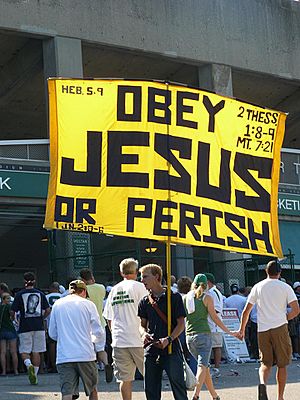Fundamentalism facts for kids

Fundamentalism describes a way of thinking where people strongly believe in a set of basic, unchanging ideas. These ideas are often about religion or how society should work. People who are fundamentalists believe these ideas are absolutely true and should not be changed. They often want to go back to the original or "root" ways of their beliefs.
The term "fundamentalism" first appeared in the United States in the early 20th century. It was used for some Protestant Christians. They believed it was very important to stick to the exact words of the Bible. They felt that modern ideas were moving too far away from these core beliefs.
Today, the word "fundamentalism" is used more widely. It describes any group that holds very firmly to their values, even if others disagree. These groups often feel that society is changing too fast. They look to their beliefs for stability and clear rules. They want to keep things the way they believe they always should have been.
Contents
What is Fundamentalism?
Fundamentalism is about holding onto core beliefs very strongly. These beliefs are often seen as absolute truths. This means they cannot be changed or questioned. People who follow fundamentalist ideas often believe their way is the only right way.
This way of thinking can apply to many areas. While it often relates to religion, it can also be about political ideas or social rules. Fundamentalists believe that their values are timeless and should guide everyone.
Why People Become Fundamentalists
People who study fundamentalism often see it as a reaction to a changing world. Modern society can be complex and confusing. Many things that used to be simple or clear have changed. This can make some people feel unsure or unsafe.
In response, some people turn to their religion or ideology. They look for something that feels stable and unchanging. They want clear rules on how to live and act. Fundamentalism offers this sense of certainty and a return to what they see as original truths.
Different Views on the Term
The word "fundamentalist" can sometimes have different meanings. Some people who are called fundamentalists do not like the term. This is because it can have negative ideas linked to it. For example, some people think fundamentalists are not open to new ideas. They might also believe they do not respect everyone's human rights.
However, some Christian groups in the U.S. actually use the term "fundamentalist" for themselves. They see it as a positive way to describe their strong faith. But they might not like being grouped with fundamentalists from other religions, like Islam. This shows that the term means different things to different people.
The History of Fundamentalism
Fundamentalism started as a movement in the United States. It began in the early 1900s among conservative Presbyterian scholars and religious thinkers. These people worked at a place called Princeton Theological Seminary.
Soon, the idea spread to other Christian groups, like the Baptists. This happened around the time of the First World War. The main goal of this movement was to strengthen traditional Protestant Christianity. They wanted to protect it from new ideas that they felt were harmful. These new ideas included different ways of studying the Bible and new scientific theories like Darwinism.
The term "fundamentalism" came from a series of meetings called the Niagara Bible Conference. These meetings happened between 1878 and 1897. They helped define the "fundamental" or basic beliefs of Christianity. The term also became popular because of a collection of twelve books called "The Fundamentals". These books were published starting in 1910 and explained core Christian beliefs.
Core Beliefs of Fundamentalism
While not all fundamentalists believe exactly the same things, they often share strong views on certain topics. These topics can be similar across different religions or belief systems. Some common areas where fundamentalists have strong opinions include:
- How society should be organized and what rules should guide it.
- The role of religion in making laws and guiding government.
- The importance of teaching religious values in schools.
- How to understand Science and its relationship to religious teachings.
- Ideas about how people should live their lives and behave.
See also
 In Spanish: Fundamentalismo para niños
In Spanish: Fundamentalismo para niños
 | Shirley Ann Jackson |
 | Garett Morgan |
 | J. Ernest Wilkins Jr. |
 | Elijah McCoy |


